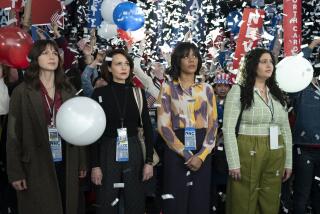THE POWER OF THE PRESS: : THE BIRTH OF AMERICAN POLITICAL REPORTING by Thomas C. Leonard (Oxford University: $22.50; 273 pp., illustrated)
- Share via
Thomas C. Leonard has written an important and radically new history of American political journalism. In “The Power of the Press,” he undercuts the myths that American journalists like to believe about themselves and that all Americans learn as basic tenets of their civic education.
According to most journalists, the freedom of our news media “to call them as they see them” and to act as “the fourth estate,” are key elements in American democracy. Supposedly, by monitoring political processes and activity, the media enable democracy to work. Quoting Thomas Jefferson’s famous remark that he would rather see newspapers without government than government without newspapers, journalists and textbooks affirm that the commitment to a free press was born with the nation.
According to Leonard, Jefferson’s comment was a “ bon mot , not a commitment” and “Few of the men who drafted the Constitution believed that newspapers would play a central role in the Republic.” Rather, those men did everything they could to keep their deliberations secret so they could feel free to compromise. As Leonard documents, newspaper readers in the new republic received more information about what was happening in the English Parliament than in the American Congress.
Leonard demonstrates that the history of American political coverage is a story of cozy collaboration between the press and the politicians: During the Jacksonian period, for example, politicians edited reporters’ accounts of speeches, often radically changing content from the original extemporaneous delivery. When reporters did attack politicians, Leonard points out, they were more interested in discovering character flaws than investigating policy decisions.
The style of political journalism honed during the progressive era, Leonard writes, helped make voter turn-out in America one of the lowest in the Western world. As he sees it, in the name of elevating political debate by undercutting the political participation of the uninformed (then-recent immigrants), journalists caused the slide in voting that began in 1912 and has continued to this day.
Leonard makes his argument through seven case studies that concentrate upon the development of the narrative forms used in political reporting. Because “The Power of the Press” is episodic and the first two chapters concentrate upon regional newspapers in the days before a national press corps, he does not document the development of a continuous national tradition about political narratives.
Rather, Leonard uses the early chapters--a consideration of the New England Courant’s “fact-free” attack on the efforts of Boston ministerial elite to stem a smallpox epidemic in 1721, an analysis of equally fact-free Colonial stories intended to whip up anti-British fervor, and a dissection of the secrecy surrounding both the Constitutional Convention and early American Congresses--to debunk the standard history of the media as the fourth estate.
Then, Leonard turns to practices that have national continuity, especially the development of an institutional coziness between press and Washington politicians during the Jacksonian era. He demonstrates that as reporters grew more skilled, politicians lost some of their ability to compromise; they could no longer say one thing in Washington and broadcast different views at home. But the coziness between politicians and press did not abate. Rather, it took the now-familiar form of the political interview, in which politicians edited reporters’ stories about their statements.
Finally, Leonard turns to the muckrakers. Insisting in elite journals that the American voter should be an informed voter, these progressive journalists “scoffed at” the prevailing politics of ethnic and religious loyalties, patronage and public spectacles, “as they labored to make politics better.” They indicated rural as well as urban areas and showed that no ethnic group had a monopoly on misgovernment. By increasing anxiety about the political system in an era of anxiety about social, economic and familial change, Leonard argues, the muckrakers may have diminished political participation as well.
Leonard is too wise a historian to think that the muckrakers were the only force feeding political discontent. But to speak about how political coverage fed anxieties does not suffice. Modern history is a history of anxiety.
A better explanation of the impact of progressive reporting may lie in the changing economics of newspapers and the growing centralization of capitalism discussed in Michael Schudson’s and Daniel Schiller’s “The Objectivity of News: The Public and the Rise of Commercial Journalism.”
Yet, outside of occasional editorial lapses, “The Power of the Press” is a splendid, if episodic book.
More to Read
Sign up for Essential California
The most important California stories and recommendations in your inbox every morning.
You may occasionally receive promotional content from the Los Angeles Times.













